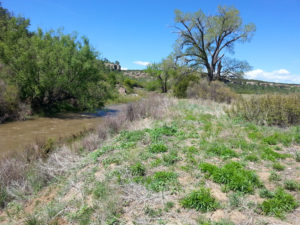
Rio Mora National Wildlife Refuge
Photo: Joe Zebrowski/Highlands University
Las Vegas, N.M. – Community volunteers will have the opportunity to plant native cottonwood trees at the Rio Mora National Wildlife Refuge on March 21 to help restore river habitat.
New Mexico Highlands is one of the partners sponsoring the tree planting.
“We invite the community to join us in planting cottonwood trees as part of our ongoing effort to restore riparian habitat and improve the hydrology at the refuge,” said Joe Zebrowski, the liaison between Highlands and the Rio Mora National Wildlife Refuge. “These trees are important because they help stabilize the banks of the river and provide important wildlife and bird habitat.” In addition, Zebrowski said, the trees help shade Rio Mora, improving fish habitat.
“This is a unique opportunity to get behind the scenes at the scenic Rio Mora National Wildlife Refuge, which is normally closed to the public. The activity will run from 10 a.m. to 3 p.m., but you don’t need to stay the entire time. Please bring your lunch if you stay all day,” Zebrowski said.
He said that the feedback from volunteers at the Rio Mora National Wildlife Refuge is that the scenic setting of the Rio Mora the canyon is breathtaking.
“Volunteers will learn first-hand how river restoration projects work. Highlands graduate Shantini Ramakrishnan, the research and restoration coordinator at the refuge, will share her experience with restoring river habitat,” Zebrowski said.
Zebrowski, who is also the director of geospatial technology at Highlands, said no experience is needed to volunteer. Training and tools will be provided. Volunteers need to bring work gloves, a water bottle, and sturdy boots.
The Rio Mora National Wildlife Refuge is located approximately 25 miles northeast of Las Vegas.
Other partners for the March 21 volunteer day at the Rio Mora National Wildlife Refuge include the U.S. Fish and Wildlife Service, the Denver Zoo, and the Friends of the Las Vegas National Wildlife Refuge.
For more information about volunteering, contact Zebrowski at 505-426-2146 or jpzebrowski@nmhu.edu.
